Electoral irregularities like stamping ballot papers the night before the polls and ballot stuffing by capturing booths on the election day took place in 47 out of 50 constituencies surveyed, says a TIB study on the 11th parliamentary polls.
Other irregularities include silence of law enforcers and administrative officials, casting fake votes, barring voters from going to polling stations, forcing voters to cast vote for a specific symbol and barring polling agents from going to centres, the study found.
Transparency International Bangladesh unveiled the study titled "Review of Election Process of 11th National Election" through a press conference at its office in the capital yesterday.
It termed the election "partially participatory, non-competitive, questionable and faulty" and demanded judicial inquiry into the reported irregularities during the election.
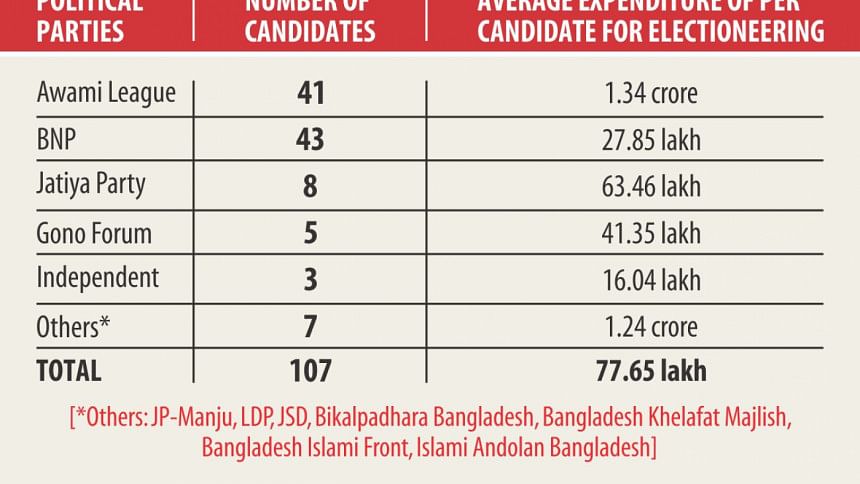
The study, based on interviews of election stakeholders including law enforcement agencies, candidates and voters, was conducted between November 10 last year and January 10 this year in randomly selected 50 out of 299 constituencies that went to polls on December 30.
Polls to Gaibandha-3 seat were postponed after the death of a candidate.
Of the 50 seats, the ruling Awami League candidates won 40, Jatiya Party six, Gono Forum two while BNP and JP-Manju won one each.
Speaking at the press conference, Iftekharuzzaman, executive director of TIB, said, "Faulty election will hamper democracy."
He added, "The Election Commission failed to act neutrally and the role of a section of polling officers and law enforcement agencies were biased."
The TIB boss also said not all the candidates were allowed to conduct electioneering freely while voters faced obstacles to cast their votes. So this election was partially participatory, he added.
Contacted, Election Commissioner Rafiqul Islam trashed the TIB study and called it “pre-determined” and “imaginary”.
TIB did not provide the names of 50 constituencies.
The report says the “50 seats covered under the survey are in 45 districts of nine divisions. Of those, the highest -- 11 seats -- are in Dhaka division, followed by Chattogram with nine. The lowest -- four seats each -- are in Sylhet and Barishal.”
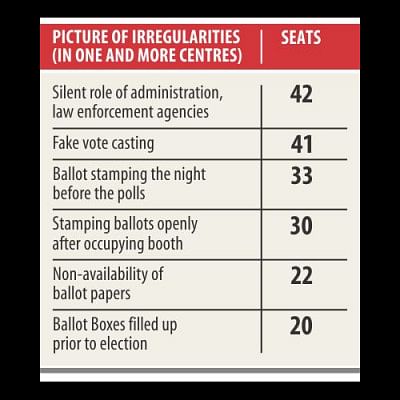
MAJOR IRREGULARITIES
Presenting the report, TIB Senior Programme Manager (research and policy) Shahjada M Akram said irregularities were witnessed in at least one or more voting centres of 47 out of 50 constituencies.
Ballot papers stamping took place the night before the elections in 33 constituencies, stamping ballots openly after occupying booths in 30 seats on the election day and non-availability of ballot papers in 22 constituencies.
The TIB study found ballot boxes filled-up prior to the beginning of polling in 20 constituencies; voters forced to cast vote for a particular symbol in 26 constituencies, people barred from going to centres in 26 seats, voters driven away from polling centres in 21 seats and beating up supporters of opponents in 11 constituencies.
The survey found casting of fake votes in 41 seats, silence of the administration and law enforcing agencies in 42 seats and obstructing and driving out polling agents in 29 seats.
In each of the 50 constituencies, not all the polling centres necessarily saw the anomalies. Irregularities took place in one or more centres of a seat, the watchdog said.
When asked who were behind or carried out the irregularities, Iftekharuzzaman and Shahjada told the press that they “cannot” say this.
EXPENSES 3 TIMES HIGHER
Since the election schedule announcement till the voting, the TIB study found, election-related expenditure of a candidate was Tk 77,65,085 in those seats, three times the amount fixed by the Election Commission.
A candidate can spend maximum Tk 25 lakh in electioneering, according to the EC.
In terms of the expenditure, the ruling AL candidates were in the top position as they spent five times the ceiling while the independent candidates were in the lowest.
The study found 41 AL candidates spent Tk 1.34 crore each on an average, followed by its alliance partner Jatiya Party as eight of its candidates spent Tk 63 lakh each.
A total of 107 candidates of several parties came under the survey.
Five Gono Forum candidates came third in the list with Tk 41 lakh each while its partner BNP came fourth in the tally as 41 of its candidates spent Tk 28 lakh each.
On an average, seven candidates of other parties spent Tk 1.24 crore each while three independent candidates spent Tk 16 lakh each.
Iftekharuzzaman said the picture of election expenditure of candidates remains same as in 2008 election. A candidate on an average spent three times the limit during electioneering for that polls.
VIOLATIONS BY AL CANDIDATES
The study found that AL candidates violated election code of conduct more than others.
It said 95 percent AL candidates violated election code of conduct by bringing out processions or holding “showdowns” using vehicles, while 88 percent JP candidates and 31 percent BNP candidates did the same offence.
The TIB said 80 percent AL candidates, 75 percent JP and 44 percent BNP candidates pasted posters violating the electoral code. Seventy eight percent AL candidates created obstacle to street rallies, indoor meetings and other electioneering of other candidates violating the electoral code, while 50 percent JP and 2.8 BNP candidates did the offence.
EC UNABLE TO ACT PROPERLY
TIB in its report alleged that EC in maximum cases was unable to play a proper role during the election process. It did not take effective steps for ensuring all parties' participation in the election.
No role was played to create equal scope for electioneering for all parties. The EC also failed to create an example by taking steps against electoral code violation by ruling party men.
“While in one hand the EC has failed to create a level playing field for all parties and candidates, on the other hand difference of opinions of commissioners regarding it became public,” the report said.
The EC also made “transparency of election” questionable by controlling the flow of information, slowing down internet speed and putting restriction on the election observers, it said.
The TIB recommended the authorities concerned appoint honest, skilled, neutral and courageous persons as election commissioners and enact law fixing process and qualification for the appointment.
It also said the Election Commission, administration, law enforcing agencies and all others will have to be natural and free from influence of any party for the sake of free, fair and acceptable election under a partisan government.
METHODOLOGY
The study was conducted to review how far the election was fair, neutral and legal and how the EC, political parties and candidates followed electoral laws and code of conduct. It also analysed the claims of the candidates about spending and reviewed the role of stakeholders of election.
The study followed a qualitative method including content analysis, interviews of information providers and observations. Information providers are candidates, party activists, law enforcers, returning officers and other election officials, including Electoral Tribunal officials, local journalists and voters.
The study also used secondary sources of information like laws and regulation, published and unpublished research reports as well as newspaper reports.
Here is the full report of TIB


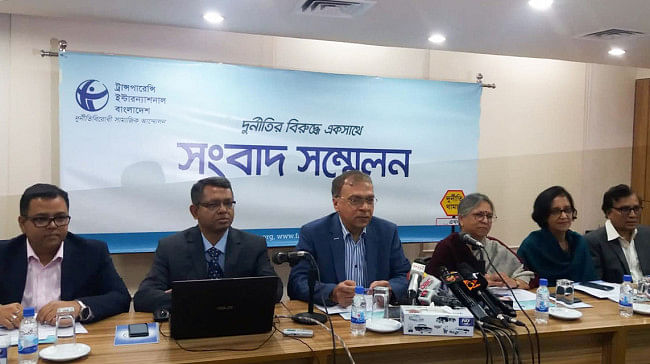
 For all latest news, follow The Daily Star's Google News channel.
For all latest news, follow The Daily Star's Google News channel. 

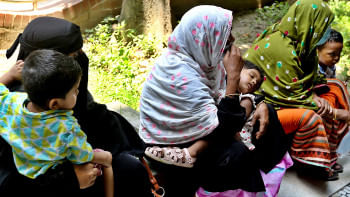
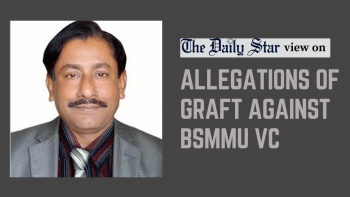

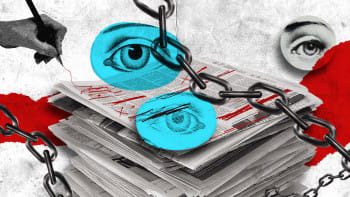


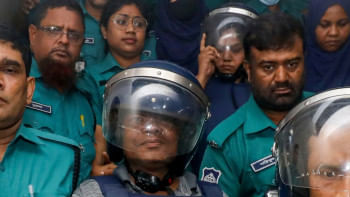

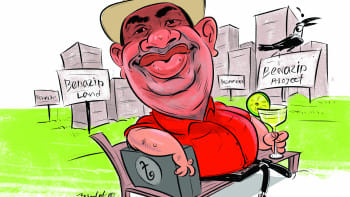
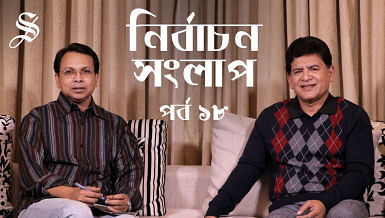
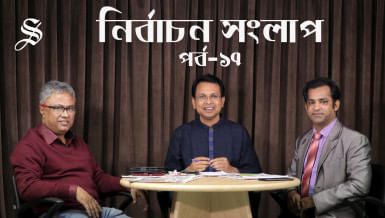
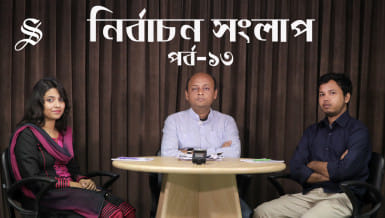
Leave your comments